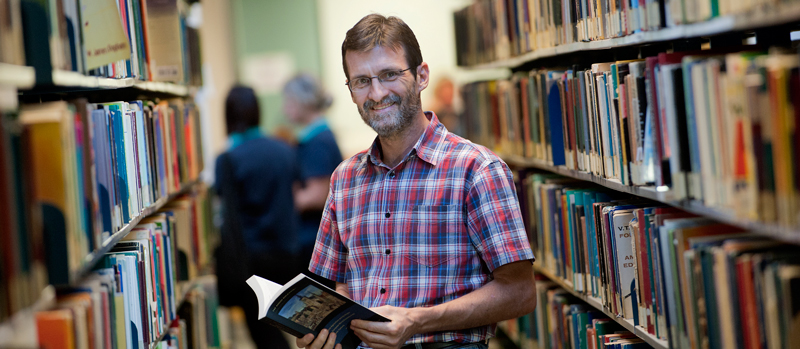Researcher Highlights
Changing the world through life's lessons
Associate Professor Tom Griffiths
Associate Professor Tom Griffiths's research is a means to a rather significant end.

As program leader of the Comparative and International Education Group University of Newcastle (CIEGUN), Tom is out to change the world, or at least "to contribute to the process of transformation".
"The most important purpose of education, is its potential to prepare populations with the knowledge, skills and dispositions required to transform the capitalist world-system, in which we are currently living, in favour of a more democratic, just, equal and peaceful alternative system," Tom says.
CIEGUN emerged from work in the Comparative and International Education field by Tom and his colleague Dr Zsuzsa Millei.
Tom's research in the comparative field began with a PhD thesis that advanced a world-systems historical analysis of secondary schooling in Cuba from 1959 to 1989.
Zsuzsa extended her doctoral work on early childhood education in Australia by comparing it to the kindergarten system in socialist Hungary. She "was similarly engaged in analyses that explore local and national ideologies, practices, and their connections with broader historical phenomena," Tom explains.
The pair later worked on a co-edited volume (Re-theorizing Discipline in Education: Problems, politics & possibilities) that included some comparative and international analysis, and extended this analysis with a co-edited book (Logics of socialist education: Engaging with crisis, insecurity and uncertainty).
They also guest edited a special issue of a journal, Globalisation, Societies and Education, on Education in / for socialism: Historical, current and future perspectives.
"The recruitment of two comparative and international researchers to (UoN's) School of Education in 2011/12, Stephanie Bengtsson and Nisha Thapliyal, helped to achieve a critical mass of scholars working in the field," Tom explains.
"We identified some common ground with respect to analyses of challenges to dominant educational policy, including challenges advanced by social and political movements, parties, and ideologies. And Linda Newman's long-standing work in Chile on community-based reform of early childhood education saw her join the group."
CIEGUN has expanded to include RHD candidates working directly with CIEGUN academics, and collaborations with other UoN colleagues across faculties interested in comparative and international research, and with international colleagues in Venezuela, Hungary, South Africa, India, Norway, Denmark, the UK and the USA.
Tom says the main aim of the group is to "advance comparative and international research that has a critical edge from a range of theoretical perspectives and methodological approaches".
"By critical edge I mean research that critiques dominant educational policy within a broad social justice framework that sees education as a mechanism for creating and facilitating alternatives.
"The scope here is deliberately broad to include, under the CIEGUN umbrella, policy analysis across various levels of scale (local, national, regional, international/global), time (historical, contemporary and prospective), educational sectors (early childhood through to post-school), and theoretical perspectives.
Tom is forthright about his motivation.
"It comes primarily from an understanding of capitalism as a historical world-system, and the contributions that systems of mass education have made to its functional operation over time; and the accompanying need to develop contemporary anti-systemic movements that are pursuing transitions toward more just, peaceful, equal and democratic alternatives," he says.
"I think there is something like a consensus globally that mass education ought to play a role in preparing populations to meet contemporary challenges like climate change, poverty, and sustainable development, in ways that can deliver lasting, peaceful and democratic solutions."
The University of Newcastle acknowledges the traditional custodians of the lands within our footprint areas: Awabakal, Darkinjung, Biripai, Worimi, Wonnarua, and Eora Nations. We also pay respect to the wisdom of our Elders past and present.
